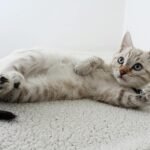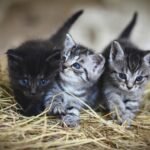Have you ever wondered if your cat thinks of you as more than just a food provider? Cats are often painted as mysterious and independent, but the truth is, many of them form deep emotional bonds with their humans. If you’ve ever woken up to a purring feline on your chest or found your cat following you from room to room, you might be more important to your cat than you realize. It’s both heartwarming and surprising to discover that, just like dogs, cats can see us as their safe haven—their emotional anchor. Let’s dive into the subtle signs and behaviors that reveal whether your cat truly sees you as their emotional anchor.
Your Cat Seeks Comfort in Your Presence

One of the clearest signs that your cat sees you as an emotional anchor is their tendency to seek you out when they’re feeling vulnerable or scared. Maybe there’s a thunderstorm raging outside, or perhaps the vacuum cleaner has just made its intimidating appearance. In moments like these, if your cat comes running to you for comfort, it’s a strong signal of trust. Cats rarely show their softer side to just anyone—and when they do, it’s a touching reflection of their emotional connection to you. The way they curl up next to you, or even on top of you, shows they feel safest in your presence. Some cats may even knead your lap or chest, which is a behavior rooted in kittenhood and associated with feelings of security.
They Follow You Around the House

It’s not just dogs who like to shadow their favorite humans. If your cat often trails behind you from room to room, it’s a telltale sign of attachment. This behavior goes beyond simple curiosity. When your cat chooses to be in the same space as you, even when nothing is happening, it means they genuinely enjoy your company. It’s their way of silently saying, “I feel better when you’re nearby.” Even if they don’t always interact directly, their presence by your side is evidence of a deep-rooted bond. Some cats may even wait outside the bathroom door or sit patiently on your desk while you work, just to stay close.
Noticeable Changes in Mood When You’re Gone

Another poignant sign that your cat sees you as their emotional anchor is how they react when you’re not home. Some cats may become noticeably more withdrawn, less playful, or even refuse to eat as much. You might come back to find your usually independent cat suddenly clingy or vocal, expressing how much your absence was felt. This change in behavior isn’t just about routine—it’s about emotional reliance. Some owners report their cats greeting them at the door, weaving between their legs, and vocalizing more than usual after being left alone, all pointing to a strong attachment.
Seeking Physical Contact and Cuddles

Physical touch is a powerful indicator of trust and emotional dependence in cats. If your cat seeks out cuddles, headbutts you, or gently rubs against you, they’re not just being cute—they’re sharing affection and marking you as part of their inner circle. Cats have scent glands on their cheeks and forehead, so when they nuzzle you, they’re mixing their scent with yours, creating a shared “family” smell. This kind of physical bonding is especially telling, as not all cats are naturally cuddly. When your feline friend chooses to snuggle up next to you, it’s a sign of comfort and emotional security.
Your Cat Communicates With You Frequently

Communication is a two-way street, and cats who see their humans as emotional anchors often go out of their way to “talk.” Whether it’s a soft trill, a persistent meow, or a chirp, your cat is trying to connect with you. Some cats will even “answer” when you speak to them, showing their eagerness to interact. This conversational style isn’t just about asking for food—it’s a sign that your cat values your attention and feels safe expressing themselves around you. The more your cat communicates, the stronger the emotional bond is likely to be.
Demonstrating Playful and Relaxed Behavior

A cat that feels emotionally anchored will often reveal their playful side in your presence. When your cat engages you in games, brings you their favorite toy, or rolls onto their back to expose their belly, they’re showing a high level of trust. Play is a vulnerable activity for cats, and sharing it with you means they feel completely at ease. You might notice your cat chasing imaginary prey or batting at strings when you’re nearby, a sign that they associate you with fun and safety. These joyful moments are a clear indicator that your cat’s emotional well-being is closely tied to you.
Turning to You During Stressful Situations

Cats are creatures of habit, and disruptions—like moving to a new house, having visitors, or changes in their environment—can stress them out. During these times, a cat that sees you as their emotional anchor will often look to you for reassurance. They may hide less if you’re around, or even seek out your lap to calm down faster. Sometimes, they’ll vocalize or display more affection as a way to cope with anxiety. Your steady presence becomes their comfort zone, and they rely on you to help navigate life’s uncertainties.
Displaying Signs of Jealousy or Protectiveness

Believe it or not, cats can get jealous or protective when it comes to their favorite human. If your cat tries to wedge themselves between you and another pet, or even a person, it’s a sign that they see you as their emotional anchor. They may paw at you, meow, or even act out to regain your attention. While some might call this behavior possessive, it’s really just your cat’s way of saying, “You’re important to me, and I don’t want to share you.” This level of attachment is both touching and revealing of the depth of your bond.
The signs that your cat sees you as their emotional anchor are often subtle, but they speak volumes about the special connection you share. From seeking comfort in your presence to expressing jealousy, these behaviors highlight a relationship built on trust, security, and love.

Growing up traveling and experiencing new cultures and wonders, I have had a passion for nature, adventuring, photography, and videography. I am currently working towards a BSc in Biodiversity and Ecology at Stellenbosch University, and I hope to specialise in Marine Sciences one day.
Please send any feedback to Feedback@animalsaroundtheglobe.com





